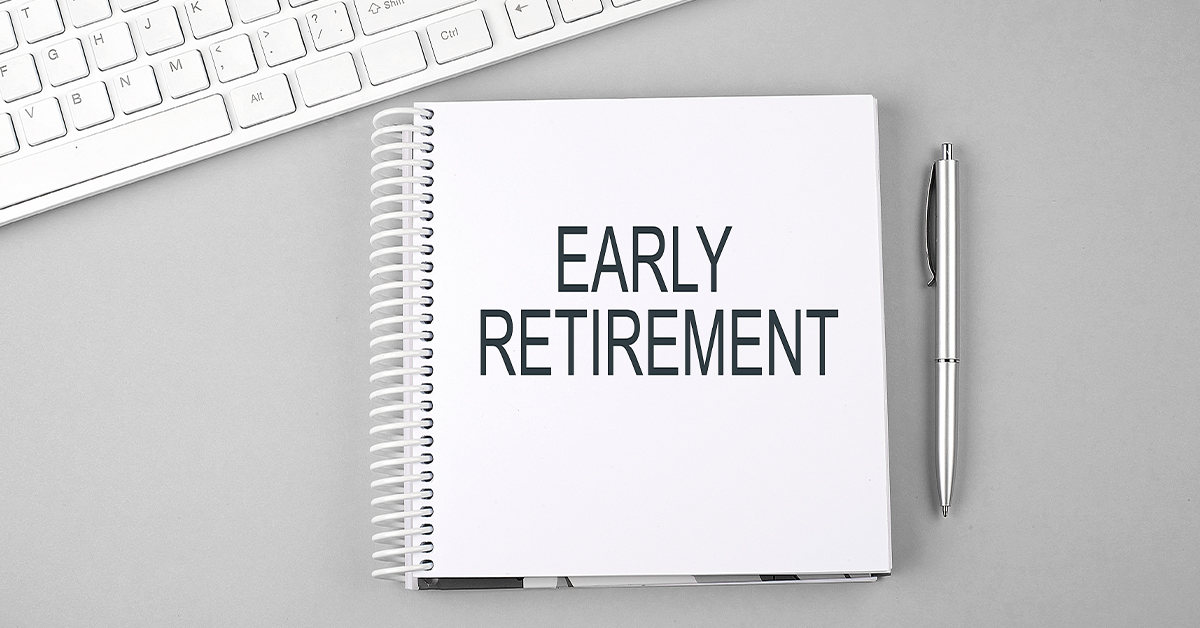Be in the know
Retirement Tip of the Month

Planning to Retire Before Age 65? Here’s What You Need to Know
Whether you choose to retire before age 65 or are forced to retire due to health issues or some family circumstances, there is a question you must address. What will you do about health insurance until you become eligible for Medicare? Many Americans retire before the typical retirement age, whether by choice or need. Unfortunately, health insurance for these early retirees is usually more expensive than expected. A couple’s monthly coverage premiums could run between $1,700 and $2,200. However, this is dependent on where they live, their age, and the sort of insurance they need. In addition to premiums, deductibles, copays, and medications can also cost hundreds of dollars.
Health insurance is the thing that keeps many people employed, even if they want to retire earlier and have enough money to. Prior to the Affordable Care Act, people with major pre-existing conditions were frequently denied self-purchased coverage. Now, however, self-purchased coverage is available in all states, regardless of medical history. The Affordable Care Act also provides income-based subsidies, making insurance significantly more affordable than it would otherwise be.
Meanwhile, the American Rescue Plan (ARP) and the Inflation Reduction Act enhanced the Affordable Care Act’s affordability up until the end of 2025. However, extending that into the future would necessitate another Congressional act. Approximately half of Americans* receive their health insurance through their employer. It’s common for people to transition directly from employer-sponsored health insurance to Medicare. Many people, whether active or retired, may be eligible to continue receiving supplemental coverage from their employers until they become eligible for Medicare, depending on their circumstances. However, if you want or need to retire before the age of 65, there are a few healthcare options to consider in the interim. Today, we’ll go over each one.
State Health Insurance Marketplace
There’s now a health insurance marketplace/exchange in each state where health coverage can be purchased. This is thanks to the Affordable Care Act. You can join these plans regardless of your medical history, and any pre-existing problems will be covered once your plan is in force. Enrollment is limited to either the annual open enrollment period or a special enrollment period triggered by a qualifying event. Termination of your employer-sponsored health plan is a qualifying event, allowing you to switch to a marketplace plan after leaving work.
Premium Subsidies
The Affordable Care Act establishes income-based premium tax credits (premium subsidies) through your state’s marketplace or exchange. Most people who purchase health insurance through the marketplace receive these subsidies. They cover a large percentage of the premiums. The American Rescue Plan and Inflation Reduction Act expanded the scope and availability of these subsidies through to 2025. Subsidies now make up a higher share of total premiums. Furthermore, the income requirement for subsidy eligibility, which was previously 400% of the poverty line, has been removed for now. Congress could opt to extend these provisions beyond 2025. If they don’t, the income threshold for premium tax credits will be reset to 400% of the poverty line.
COBRA or State Continuation
Consolidated Omnibus Budget Reconciliation Act (COBRA) coverage may be worth considering if you are eligible. This will depend on a number of factors, including:
- How long it will take before you become eligible for Medicare
- How you have spent on out-of-pocket expenses this year
- Are you qualified for subsidies in the marketplace or exchange?
- Will you be able to keep your existing medical providers if you change plans?
- If you can afford to pay the entire cost for your coverage while on COBRA
If you’ve already reached your out-of-pocket maximum for the year, or if you’re in the middle of complex medical treatment and don’t want to worry about switching health insurance, COBRA or state continuation could be a beneficial option.
Your Spouse’s Health Plan
If your spouse is already employed and has access to a health insurance plan that includes spousal coverage, you can enroll in that plan whenever your current coverage expires. The end of your coverage will result in a unique registration period for your spouse’s plan. Even if you and your spouse were both covered by your plan, you will be able to move to your spouse’s plan once your current one ends. Assuming, of course, that coverage is available. It is crucial to note, however, that if you are qualified to enroll in your spouse’s plan, you may not be eligible for a marketplace premium subsidy. The IRS resolved the “family glitch” in 2023.
Medicaid
If your income drops significantly after retirement, you may be eligible for Medicaid. Most states allow persons under the age of 65 who earn less than 138% of the federal poverty line to get Medicaid. Medicaid eligibility can be determined using your monthly income. In contrast, Marketplace premium subsidies are based on annual income. So, regardless of how much you earned earlier this year, if your monthly income is less than one-twelfth of the annual income limit for Medicaid eligibility, you may be eligible for coverage.
Where to Learn More
If you’re considering retiring early (or need to) and want to go over the options available to you, visit HealthCare.gov. If your state operates its own exchange, then you will be redirected there. Browse the available plans based on age, zip code, tobacco status, and income to examine your available options. If you are currently receiving medical care, be sure to review the relevant provider networks and drug formularies. Even if they are offered by the same carrier, you shouldn’t assume they’ll necessarily be the same as your current plan.
If you retire before age 65, you will have a few different alternatives available for health insurance until you become eligible for Medicare. Your specific circumstances will determine which solutions are right for you. Or, depending on your circumstances, you might discover that it’s best to simply continue working until you become eligible. That way, you can continue utilizing your employer-sponsored health insurance. If you need to retire earlier, though, you’ll likely have access to reasonable health insurance thanks to one of these options.
*Source: The Wall Street Journal

Tax Breaks Retirees Can Use in 2024
It’s crucial that retirees take full advantage of every available tax break they can. This is especially true if you’re on a fixed income; you

Getting Ready For Tax Season
With tax season rapidly approaching, the IRS is taking steps to remind taxpayers how they can prepare to file their 2023 federal tax return. A

Benefits of Getting a Retirement Job
Believe it or not, many Americans choose to continue working in some capacity during retirement. It may seem oxymoronic, but having a part-time retirement job

The $1000 Rule and the 4% Rule of Retirement
How much money do you need to save for retirement? How much income will you need each year? As you approach retirement, you will want

What You Need to Know About 401(k)s in 2024
It’s important to save up as much money as you can before retirement. That way, once you retire, you don’t end up overly dependent on

What Would a Government Shutdown Mean for You?
What Would a Government Shutdown Mean For You? The last day of September was the last chance for Congress to fund the government. Thankfully, a


